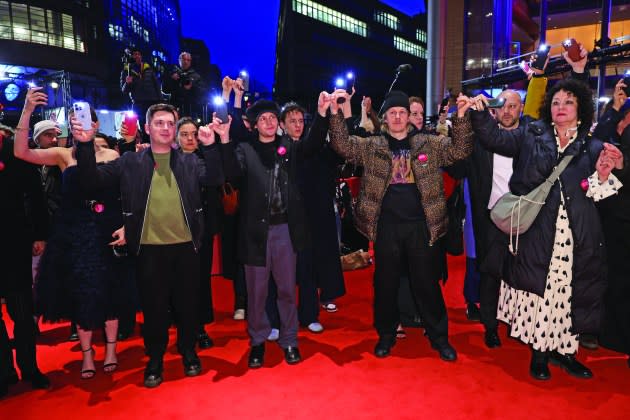Berlin Festival Deals With Impact of the Gaza War, Filmmaker Protests and Cancellations

As the Israel-Hamas war continues to rage in Gaza, repercussions are being felt at the Berlinale, which looks to be one of the most politically charged editions in recent history.
Several filmmakers have already canceled their participation to the festival in protest of Germany’s attitude towards Palestinian voices, while more than 50 Berlinale workers have signed an open letter this week demanding a ceasefire in Gaza and asking that the festival leadership take a “stronger institutional stance” on what the statement calls “the current assault on Palestinian life” and calling on the festival to take a stance that is “consistent with those taken in response to other events that have struck the international community in recent years.”
More from Variety
The war in Gaza followed Hamas’ attacks on Israel on Oct. 7, which resulted in approximately 1,200 deaths and 250 hostages taken. As the death toll continues to rise, with nearly 30,000 Palestinians killed in Gaza — a region governed by Hamas since 2006 — many attendees are drawing parallels with Russia’s war in Ukraine. They argue that the Berlinale’s muted response to the conflict in Gaza is reflective of a double standards.
“When the war in Ukraine began, or when there were demonstrations happening against the regime in Iran last year, they showed endless support to these causes, yet Gaza is now being totally ignored,” says Berlin-based Palestinian director and artist Kamal Aljafari (“Paradiso, XXXI, 108,” “An Unusual Summer”).
Last year, the fest’s strong focus on Ukraine included an opening night video address by the country’s president, Volodymyr Zelenskyy, eight Ukrainian titles or films related to Ukraine in various sections, special events at the EFM and Berlinale Talents, free market and festival accreditations to Ukrainian filmmakers and even Berlinale pin-on badges and magnets “to provide widespread visibility for the cause among Berlinale attendees.”
This year’s program does include two films from Israel and Palestine, Amos Gitai’s politically minded Israeli drama “Shikun” and the Palestinian documentary by an activist collective, “No Other Land,” about mass expulsions of Palestinians from the West Bank.
Many people working in the Arab film sector said they would boycott the festival or stage protests if it showed solidarity with Israel. “We have to see what happens at the Berlinale first before making any statement or taking any action,” says one industry representative who asked not to be named.
“In general, it’s not about boycotting when it comes to cultural activities. It is about having most of the people working in culture agreeing on a certain direction.
“We are not asking them to express solidarity with Palestine, but we need to know because we cannot be silent if they express solidarity with Israel,” the person says, adding that festivals should encourage discussions and find wider consensus rather than set a single political direction.
In January, Canadian director and video artist John Greyson, Indian-American filmmaker Suneil Sanzgiri and Ayo Tsalithaba, a Canada-based visual artist from Ghana and Lesotho, withdrew their works from the Berlinale’s Forum Expanded section.
Speaking to Variety, Berlinale artistic director Carlo Chatrian notes that Forum Expanded related more to art and reflected a slightly different community of artists.
“I don’t want to undermine that, but it’s a bit different when it comes to production companies or producers and filmmakers. I’m in contact with filmmakers and they are all eager to come because they consider the festival as a great platform actually to discuss things. And the best [way] to discuss [things] is through cinema.
“We know that we have artists that consider it not the right fit to come to Germany,” Chatrian adds. “We respect the decision. We still believe that the festival is a great place for dialogue and we want to keep it as a place for dialogue.”
Pointing to “Shikun” and “No Other Land,” Chatrian says, “We don’t shield away this content; they are part of the festival.”
Germany’s Nazi past has made unwavering support for Israel a political commandment for all of the country’s major parties, including the far-right AfD, and that view affects funding institutions and cultural events, observers note.
Ahead of opening night festivities, the Berlinale staged a demonstration defending democracy to highlight their decision to disinvite AfD members.
“By disinviting the AfD, the Berlinale has clearly positioned itself against the right-wing extremism in Germany,” the festival said in a statement.
Nick Vivarelli contributed to this story.
Best of Variety
Sign up for Variety’s Newsletter. For the latest news, follow us on Facebook, Twitter, and Instagram.
